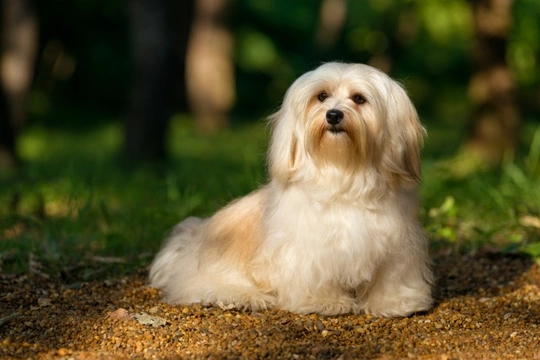
Why a Havanese dog might be the right choice of small breed for you
The Havanese dog is a small, silky coated and very loving little dog from The Kennel Club’s toy grouping, and one that has a lot to recommend it for owners and homes of all types. While the Havanese is not among the most common of dog breeds in the UK, neither are they hugely rare – falling within the top 100 dog breeds in the UK at the 94th position.
Havanese dogs have distinctive good looks, nice temperaments, and soft coats – and they tend to be healthy and long lived too, with the average lifespan across the breed as a whole being 14-16 years.
If you are looking for a small dog breed to add to your family and you are trying to pick the perfect one, the Havanese is certainly worthy of consideration.
In this article, we will look at the Havanese dog breed in more detail, to help you to make a decision. Read on to learn more.
What is a Havanese dog?
Havanese dogs are small – dogs of the breed can stand between 23-28cm tall at the withers and weigh between 4.5-7kg. They fall within The Kennel Club’s toy dog grouping, and are perhaps most distinctive for their long, thick and usually silky coats, with a soft and fluffy undercoat too. They come in a huge range of different colour combinations, offering lots of variety, and are also notable for being a very low shedding breed, which is not prone to losing large swathes of their coats around the house.
However, this trait also means that they require a lot of grooming to keep their coats in good condition, work out shed fur, and avoid knots and tangles. Daily brushing is recommended for the Havanese dog, which means that any prospective owner of a dog of the breed must be prepared to spend a reasonable amount of time each day taking care of their coats.
How much do Havanese dogs cost to buy and care for?
The average advertised price on Pets4Homes for a Havanese puppy for sale is £1,230 for a Kennel Club registered pedigree, and £837 for a non-pedigree. This is towards the top end of the scale for average prices across all breeds and types of dogs, which does mean that the Havanese may be outside of the budget of some prospective owners.
However, the Havanese dog is reasonably economical to keep, requiring everything in small sizes and not eating huge amounts of food! They also tend to be fairly robust and healthy, and so are not one of the breeds that are likely to cost a fortune in veterinary fees over the course of their lives.
The Havanese temperament
Havanese are lively, quick and surefooted and can be quite excitable, which means that they tend to keep their owners on their toes! However, they are also fun loving, very friendly and highly affectionate, which provides a nice balance and means that they have a wide following of fans and enthusiasts. They are also very smart little dogs that learn quickly, meaning that they can be taught a wide range of different skills and commands. That said, training needs to be kept varied and interesting in order to capture and keep the dog’s attention and prevent them from concentrating on something else that they may find more interesting!
They like lots of attention and having someone around for company most of the time, but when properly trained and managed, they should be perfectly fine to leave on their own with something to entertain themselves with for a couple of hours at a time.
However, the Havanese may become bored and destructive if left with no stimulation or left on their own for too long, and so they benefit from living in a home where someone is able to stay with them for the majority of the day.
Caring for a Havanese dog
One thing that all Havanese owners need to be prepared for is the requirement to brush and groom the dog’s coat regularly, which usually means on a daily or almost daily basis. Because the breed’s coat is so long and doesn’t shed heavily, it is apt to become knotted and tangled very quickly if grooming is neglected, which is much harder to sort out after the fact than it is to prevent happening in the first place.
Special attention should be paid to areas prone to knotting and tangling, such as under the belly and in the armpits, and Havanese dogs should also have the occasional bath too. You might want to take them along for bathing and grooming at a grooming parlour occasionally to make this easier.
Havanese dogs also require a reasonable amount of exercise, as they tend to be lively and fun-loving dogs that like to play and run around. Opportunities for socialisation should be provided from an early age, and training should begin early too, to get the dog used to spending time alone without becoming destructive and to ensure that they follow commands.
Havanese dogs can be hugely rewarding to own and are certainly worthy of consideration if you are looking for an outgoing, fun loving companion that is alert, friendly and entertaining. However, it is important to remember that they need more grooming than most breeds, and that just because they are small doesn’t mean that they are particularly sedentary!



